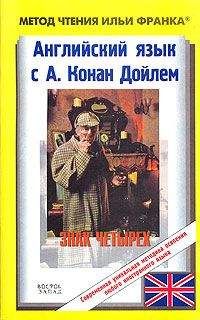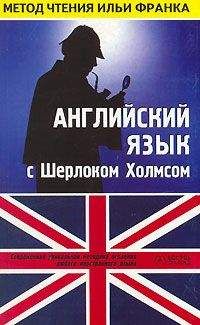"Yes, and no later than to-day. That is why I have come to you. This morning I received this letter, which you will perhaps read for yourself."
"Thank you," said Holmes. "The envelope too, please. Post-mark, London, S. W. Date, July 7. Hum! Man's thumb-mark on corner, — probably postman. Best quality paper. Envelopes at sixpence a packet. Particular man in his stationery. No address. `Be at the third pillar from the left outside the Lyceum Theatre to-night at seven o'clock. If you are distrustful, bring two friends. You are a wronged woman, and shall have justice. Do not bring police. If you do, all will be in vain. Your unknown friend.' Well, really, this is a very pretty little mystery. What do you intend to do, Miss Morstan?"
"That is exactly what I want to ask you (это в точности то, что я хочу спросить у вас)."
"Then we shall most certainly go (тогда мы совершенно определенно пойдем). You and I and — yes, why, Dr. Watson is the very man (вы, я и — да, как же, доктор Ватсон — самый подходящий человек; very — тот самый; именно тот). Your correspondent says two friends (ваш корреспондент говорит «два друга»). He and I have worked together before (он /доктор Ватсон/ и я работали вместе и раньше)."
"But would he come?" she asked, with something appealing in her voice and expression (но захочет ли он пойти? — спросила она с чем-то похожим на мольбу в голосе и выражении лица; to appeal — апеллировать, обращаться; взывать, умолять).
"I should be proud and happy," said I, fervently, "if I can be of any service (буду горд и счастлив, — пылко сказал я, — если смогу быть полезен; fervently — горячо, пылко, страстно; service — служба, занятие, работа; помощь, одолжение, услуга)."
"You are both very kind," she answered (вы оба очень добры, — ответила она). "I have led a retired life (я вела уединенную жизнь; to lead — вести; to retire — уходить в отставку, на пенсию; уединяться), and have no friends whom I could appeal to (и у меня нет друзей, к которым я могла бы обратиться; to appeal — апеллировать, обращаться, прибегать). If I am here at six it will do, I suppose (если я буду здесь в шесть, это устроит, я полагаю)?"
proud [praud], retire [rɪˈtaɪǝ]
"That is exactly what I want to ask you."
"Then we shall most certainly go. You and I and — yes, why, Dr. Watson is the very man. Your correspondent says two friends. He and I have worked together before."
"But would he come?" she asked, with something appealing in her voice and expression.
"I should be proud and happy," said I, fervently, "if I can be of any service."
"You are both very kind," she answered. "I have led a retired life, and have no friends whom I could appeal to. If I am here at six it will do, I suppose?"
"You must not be later," said Holmes (но не позже, — сказал Холмс). "There is one other point, however (и все же еще один вопрос; point — точка; пункт, момент). Is this handwriting the same as that upon the pearl-box addresses (этот почерк тот же, которым написан адрес на коробках с жемчугом)?"
"I have them here," she answered, producing half a dozen pieces of paper (они у меня с собой, ответила она, вынимая полдюжины клочков бумаги; to produce — производить, выпускать; представлять, предъявлять; piece — кусок; часть; обломок, огрызок).
"You are certainly a model client (вы, несомненно, образцовый клиент). You have the correct intuition (у вас верная интуиция). Let us see, now (давайте-ка глянем)." He spread out the papers upon the table (он расправил бумажки на столе; to spread — расстилать; развертывать), and gave little darting glances from one to the other (и рассмотрел их, стремительно переводя взгляд то на одну, то на другую; to give a glance — взглянуть; to dart — бросать, метать; dart — стрела; дротик). "They are disguised hands, except the letter," he said, presently (почерк стремились замаскировать, если не считать письма, — вскоре сказал он; to disguise — изменять внешность, облик; hand — рука; почерк; стиль письма; presently — некоторое время спустя), "but there can be no question as to the authorship (но в авторстве сомневаться не приходиться: «не может быть вопроса относительно…»). See how the irrepressible Greek e will break out, and see the twirl of the final s (смотрите, как неумолимо пробивается греческая е /е, написанная как греческая эпсилон/ и обратите внимание на завитушку конечной s; irrepressible — неугомонный; to repress — подавлять, усмирять; останавливать; to break out — сбегать; вырываться). They are undoubtedly by the same person (несомненно, они /написаны/ одним и тем же человеком; doubt — сомнение). I should not like to suggest false hopes, Miss Morstan (мне бы не хотелось внушать ложную надежду, мисс Морстен; false — неверный, ложный), but is there any resemblance between this hand and that of your father (но есть ли тут какое-то сходство этого почерка с почерком вашего отца)?"
disguise [dɪsˈɡaɪz], undoubtedly [ʌnˈdautɪdlɪ], false [fɔ:ls]
"You must not be later," said Holmes. "There is one other point, however. Is this handwriting the same as that upon the pearl-box addresses?"
"I have them here," she answered, producing half a dozen pieces of paper.
"You are certainly a model client. You have the correct intuition. Let us see, now." He spread out the papers upon the table, and gave little darting glances from one to the other. "They are disguised hands, except the letter," he said, presently, "but there can be no question as to the authorship. See how the irrepressible Greek e will break out, and see the twirl of the final s. They are undoubtedly by the same person. I should not like to suggest false hopes, Miss Morstan, but is there any resemblance between this hand and that of your father?"
"Nothing could be more unlike (более непохожий трудно было бы представить: «ничто не может быть более непохожим»)."
"I expected to hear you say so (я ожидал, что вы так ответите). We shall look out for you, then, at six (итак, мы будем ждать вас в шесть; to look out — подыскивать, высматривать). Pray allow me to keep the papers (будьте так любезны позволить мне не отдавать пока эти бумаги; to keep — держать, удерживать). I may look into the matter before then (возможно, я до этого времени поизучаю их еще; to look into — заглядывать; изучать; matter — вещество; вопрос, дело). It is only half-past three (пока только половина четвертого). Au revoir, then (итак, au revoir; au revoir — фр., до свидания)."
"Au revoir," said our visitor (до свидания, — сказала наша посетительница), and, with a bright, kindly glance from one to the other of us (и, задержав на мгновение на каждом из нас ясный, доброжелательный взор: «с ясным, доброжелательным взглядом с одного на другого»), she replaced her pearl-box in her bosom and hurried away (она спрятала коробочку с жемчугом за корсаж и поспешила прочь; to replace — помещать на прежнее место, возвращать обратно; to place — помещать, располагать; bosom — грудь; пазуха; корсаж). Standing at the window, I watched her walking briskly down the street (стоя у окна, я наблюдал, как она удалялась быстрым шагом вниз по улице; brisk — живой; проворный), until the gray turban and white feather were but a speck in the sombre crowd (пока ее серая шляпка и белое перышко не стали всего лишь точкой в серой толпе; speck — пятно, пятнышко; точка; sombre — мрачный, темный).
bosom [ˈbuzǝm], sombre [ˈsɔmbǝ]
"Nothing could be more unlike."
"I expected to hear you say so. We shall look out for you, then, at six. Pray allow me to keep the papers. I may look into the matter before then. It is only half-past three. Au revoir, then."
"Au revoir," said our visitor, and, with a bright, kindly glance from one to the other of us, she replaced her pearl-box in her bosom and hurried away. Standing at the window, I watched her walking briskly down the street, until the gray turban and white feather were but a speck in the sombre crowd.
"What a very attractive woman!" I exclaimed, turning to my companion (какая необыкновенно привлекательная женщина! — воскликнул я, оборачиваясь к своему компаньону).
He had lit his pipe again, and was leaning back with drooping eyelids (он опять закурил трубку и развалился в кресле, прикрыв глаза; to light — освещать; светить; зажигать; to droop — поникать, свисать; опускать; eyelid — веко). "Is she?" he said, languidly (в самом деле? — сказал он отрешенно; languid — слабый; вялый, апатичный). "I did not observe (я не заметил; to observe — наблюдать; замечать, обращать внимание)."
"You really are an automaton, — a calculating-machine!" I cried (воистину, вы автомат — вычислительная машина! — вскричал я). "There is something positively inhuman in you at times (в вас порой есть что-то положительно нечеловеческое; positive — позитивный, реальный; несомненный, точный; в полном смысле слова; human — людской, человеческий; свойственный человеку)."
languidly [ˈlæŋɡwɪdlɪ], automaton [ɔ:ˈtɔmǝt(ǝ)n], machine [mǝˈʃi:n]
"What a very attractive woman!" I exclaimed, turning to my companion.
He had lit his pipe again, and was leaning back with drooping eyelids. "Is she?" he said, languidly. "I did not observe."
"You really are an automaton, — a calculating-machine!"I cried. "There is something positively inhuman in you at times."
He smiled gently (он мягко улыбнулся; gentle — знатный; мягкий, добрый; тихий, спокойный). "It is of the first importance," he said, "not to allow your judgment to be biassed by personal qualities (очень важно: «первой = первостепенной важности», — сказал он, — не позволять, чтобы ваши суждения зависели от личных качеств; to bias — склонять; оказывать влияние). A client is to me a mere unit, — a factor in a problem (клиент для меня — всего лишь деталь, слагаемое проблемы; unit — единица; часть, элемент; factor — фактор; составной элемент). The emotional qualities are antagonistic to clear reasoning (эмоциональные качества несовместимы с ясностью мышления; antagonistic — враждебный; противоположный, несовместимый; reasoning — рассуждение, умозаключение; аргументация). I assure you that the most winning woman I ever knew (уверяю вас, что самая обворожительная женщина из тех, что я знал; winning — выигрывающий; обаятельный, привлекательный) was hanged for poisoning three little children for their insurance-money (была повешена за отравление трех маленьких детей с целью получения страховки: «за страховое возмещение»), and the most repellent man of my acquaintance (а самый отвратительный человек на моей памяти; acquaintance — знакомство; знакомый) is a philanthropist who has spent nearly a quarter of a million upon the London poor (— филантроп, который израсходовал почти четверть миллиона на бедняков Лондона; to spend — тратить, расходовать)."



